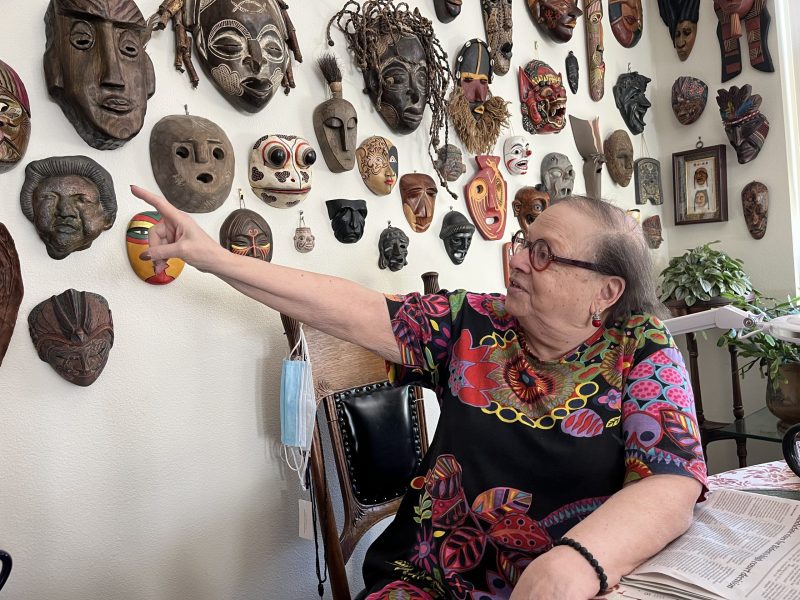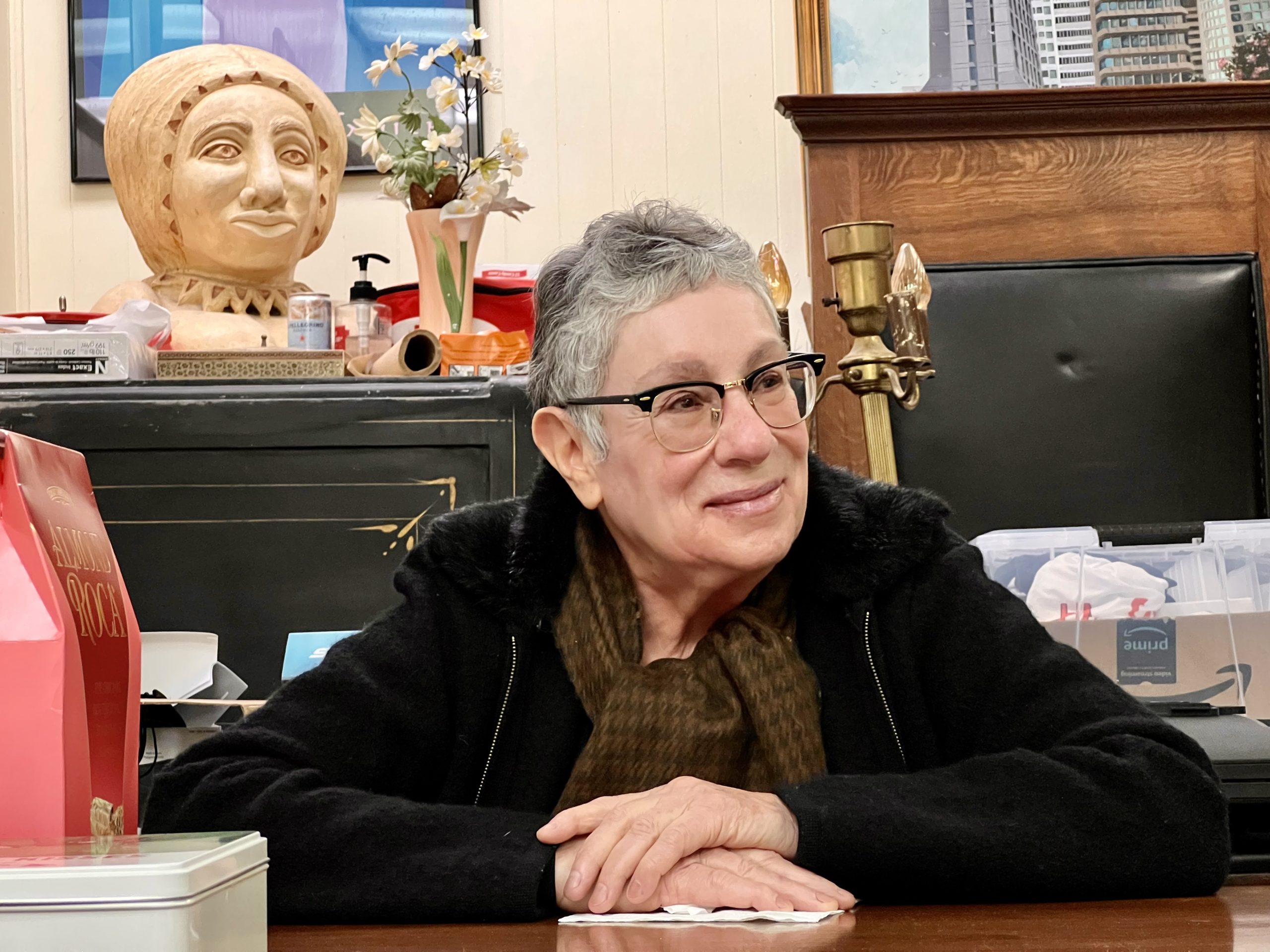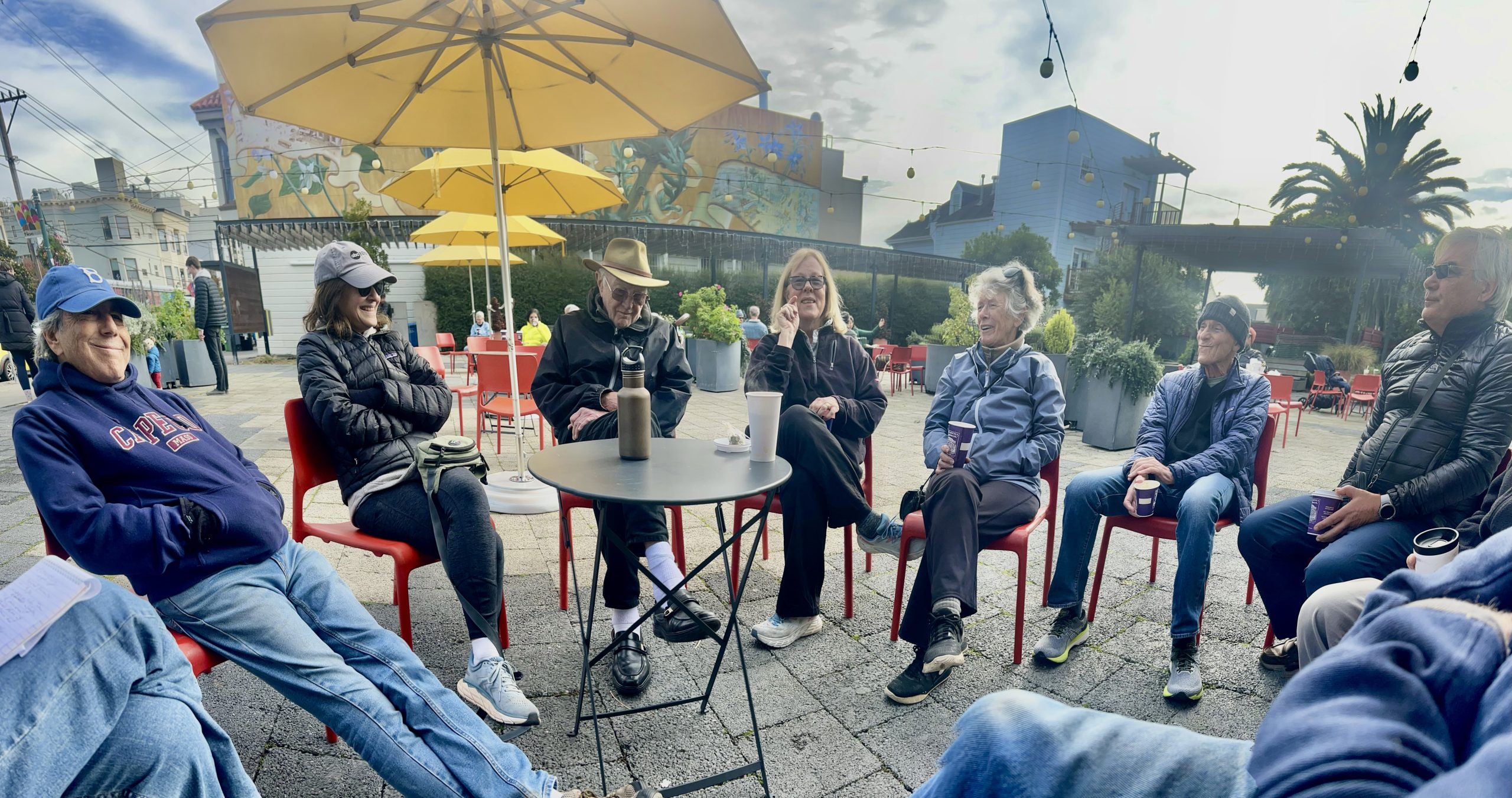She persisted: After chilly entry to San Francisco, disability specialist now on three city commissions and living happily in senior housing.
Terry Bohrer didn’t get the warm welcome she had hoped for when she moved to San Francisco. Like many new arrivals, she found the city a tough place to make friends. She and her husband joined clubs, took adult classes, and even threw parties in their apartment –to no avail. “We were lonely,” she said. She couldn’t even land a volunteer spot she thought would be a good fit.
“Volunteering in San Francisco can be really difficult,” she said. With more than three decades of professional experience in issues related to mental health and disability, she thought she’d have something to bring to the city’s Mental Health Board, which advises supervisors on policy and the efficacy of the numerous programs it supports. But, “they blew me off,” she said, having applied twice with no response.

But that was the past. Bohrer is now 82 and living in a senior community where she says she has “250 friends.” She’s also a member of three city commissions, including the one she tried to join 12 years ago. It’s now called the Behavioral Health Commission.
She also chairs both the Shelter Grievance Advisory Committee, which advocates for users of shelters when they face eviction or other penalties, and the Crisis Intervention Team Working Group, which works with the police department to develop better methods of dealing with people in crisis. She said she’s seen a culture shift in attitudes, though “initially, officers didn’t like it.” However, critics of the department still believe the shift is far from complete.
Although Bohrer is pleased with her work with the police and the shelter group, she has little positive to say about the Behavioral Health Commission.
‘Nothing changes’
“It seems to take ages and ages before anything happens and nothing changes,” she said. “My voice isn’t heard.” Her frustration is understandable – she’s used to getting things done. She’s held numerous policy-making positions on the East Coast and worked with Steny Hoyer, a Maryland Congressman, now the House majority leader, on what in 1990 became the Americans with Disabilities Act.
One of her most serious is what she sees as poor oversight of San Francisco’s mental health programs. Although there are at least 130 sites run by a plethora of providers, the commission is required to visit just five every year. “It barely seems adequate,” Bohrer said. “With 16 members (the 17th is a member of the Board of Supervisors) you’d think we could easily make more visits.”
But four of those seats, including the supervisor slot, are currently vacant, through expirations or resignations. Also handicapped by the pandemic, the commission only managed two site visits last year. Could the commission have made virtual visits? Bohrer thinks so, but Geoffrey Grier, the executive director, rejected the idea. He said the myriad of rules regulating that type of visit was far too burdensome.
Bohrer is not alone in her criticism of the commission. In 2020, the executive director retired after it was discovered she had failed to file invoices for approximately $40,000 of expenses. Also that year, the Department of Public Health and the FBI launched investigations into a federal loan obtained by the San Francisco Mental Health Education Funds, a nonprofit that funnels city money to the commission. Supervisor Catherine Stefani resigned from the commission, saying she believed the loan was improper.
No evidence of wrongdoing has been discovered – it’s not clear if the FBI and the health department are still investigating – and the commission is now headed by a new executive director. “Things were a mess,” conceded Grier, the new executive director. “But we’re getting past it,” he said in an interview.
Enacting the ADA
Bohrer had a comfortable and rather conventional life as a nurse and a doctor’s wife. A native of Queens, N.Y., she earned a registered nurse certification and worked at New York’s prestigious Mount Sinai Hospital. She met her husband, Norman, then an internist serving in the Army, and accompanied him to a posting in France where “I mostly ate pastries and rode horses.”
Returning to the U.S., the couple lived in Washington D.C. where she worked as a nurse, taught nursing, and had a daughter. The family moved to Bowie, Md., where Norman joined a medical practice. She soon had three more daughters. “They were born in a Catholic hospital, and the nurses would joke, ‘see you next year,’ even though I’m Jewish,” she said.
Bohrer worked in her husband’s practice for a time, but “I got tired of being the complaint department.” She wanted to expand her education. At that time, the 1970s, an RN certificate was not considered a college degree, and she wanted one. But getting a degree in nursing would have meant starting over with a year or two of basic courses, she discovered. “I wasn’t willing to do that. It was time to change careers,” she decided.
She did. And the five years of additional education and a series of progressively more responsible jobs in public policy prepared her for a new role – advocate and whistleblower in San Francisco.
After earning a bachelor’s and master’s degrees in social strategy and community planning, she volunteered for a local politician who became the county executive of Prince George’s County in Maryland. He gave her a job as a coordinator for programs for people with disabilities.
Hoping to make services for the disabled more accessible, she worked with Hoyer on the Americans with Disabilities Act. When the ADA became law, she helped develop a program to make county building codes comply with it. The largely male contractors who wanted exemptions underestimated her, she said.
A too-early retirement
“They figured the little woman won’t be hard to beat.” They were wrong. Building codes in the county became some of the toughest in the nation, she said, with a touch of pride.
She paused her career to run for a seat in Maryland’s state senate. “I had a wonderful time; loved every minute. Loved having to study up on issues.” But her pro-choice campaign was opposed by the Catholic Church, and she lost a close race to a long-tenured Republican incumbent.
She became director of mental health for Prince George’s County. But after nine years on the job, her husband suffered a stroke, prompting her retirement. “The day after my retirement party I woke up and said to myself, ‘Now what am I going to do?’”
The answer: build a consulting business, write grants, and help organizations develop disability programs. The business was a success. But in 2010 she was diagnosed with aggressive breast cancer and decided to move temporarily to San Francisco to be near two daughters living in Northern California, a move that became permanent.

Bohrer and her husband found an apartment with postcard views of the city and the Bay on Nob Hill. Eager to make friends, they invited the neighbors to a Halloween party in their apartment. Only a handful showed up. They took a bridge class and enrolled at the Fromm Institute. Still no friends. “People were very clannish,” she said.
Overcoming isolation
The enviable apartment wasn’t enough to make up for the isolation. After a good deal of research, they moved to a senior complex near Pacific Heights. “Suddenly we had 250 friends,” Bohrer said.
Given her many years of working on disability issues, Bohrer decided to volunteer on the Mental Health Board. But two trips and phone calls to then-Supervisor David Chui’s office were fruitless. In retrospect, Bohrer admits, her assertive East Coast-style may have been a turn-off for the staffers. “I was pretty overbearing. They were probably glad to see me leave.”
She persisted and eventually managed to get an interview with Chui, who quickly agreed to give her a seat on the board, which she’s held since 2016.
By 2020 it seemed like the commission was barely functional. According to its 2020 annual report:
“As of this writing (June 2020) only two Commissioners out of 17 has legal standing, five seats are vacant (including the Board of Supervisors seat), three have termed out (each had two two-year terms) and seven Commissioners are waiting reappointment.”
Making matters worse, the executive director, Helynna Brooke, was behaving erratically, according to Bohrer and Marylyn Tesconi, who was then chairwoman of the commission. The two commissioners discovered Brooke had not been filing invoices and were concerned that the money may have been misappropriated. When confronted, Brooke said she had been suffering from a bout of depression and wasn’t able to handle the paperwork. She retired after accounting for the money. “I don’t believe I misused anything,” Brooke said at the time. “Was I good at the accounting and invoices this past year? I wasn’t. That’s different than misusing.”
Bohrer and other commissioners were also angry when they found that Brooke had approved a $25,000 loan to the San Francisco Mental Health Education Funds. The money came from the Paycheck Protection Program, which was designed to give loans to businesses that would otherwise have to lay off employees due to the pandemic.
Accommodating an illness
But the Education Fund was fully funded and did not need to lay off employees. Angered, Supervisor Stefani resigned, but the loan was forgiven by the Small Business Administration. Neither the Department of Public Health nor the FBI would confirm the status of the investigation.
Bohrer’s ongoing fight with cancer makes it difficult to leave home, but she comes across as upbeat and engaged. She’s tech-savvy and has no trouble attending commission meetings via Zoom. Aside from her civic duties, she teaches a class for her neighbors on jewelry making, a longtime hobby, runs a small jewelry business and will sell her work at a show in her apartment in time for Valentine’s Day.
She fought a lot of battles and hasn’t always won. But reflecting on her life in public service, Bohrer is proud of what she has accomplished. “When I reflect back, I did some really good things, maybe not in the whole world, but in my world.”






Adrienne JONAS
Terry is an absolutely amazing person - always has a smile no matter what she is going through - is knowledgeable on many subjects and is certainly a great asset to the San Francisco Towers.
Judi and Gordon Harris
We are two of the 250 friends of Norm and Terry! Always at the ready to help and solve problems., Terry is a talented, unique and forceful leader. Most definitely, a true Renaissance woman.
Judy Drummond
I love Terry Bohrer!! She was my go-to when I was on the Commission. Her keen analytical mind and sense of the common good is contagious and much needed right now in San Francisco.